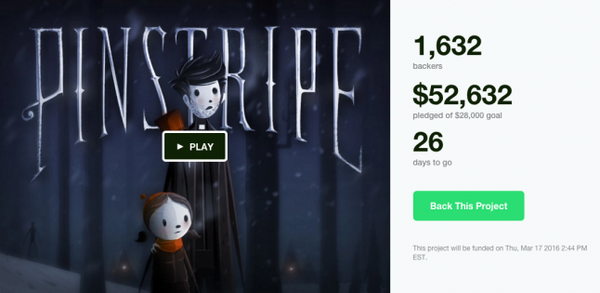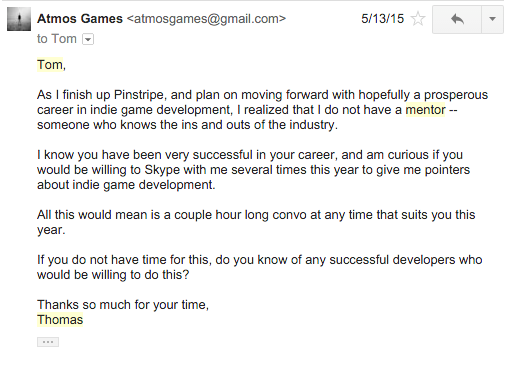
Featured Blog | This community-written post highlights the best of what the game industry has to offer. Read more like it on the Game Developer Blogs or learn how to Submit Your Own Blog Post
Why Your Kickstarter Will Fail
I woke up around 3:30 a couple days ago and I was baffled. The Kickstarter for my game Pinstripe had been successfully funded in less than a day.

After 2 full-months of Kickstarter prep and research, somehow I have launched my first successful campaign. My unrelenting insecurity was wrong: Pinstripe's Kickstarter didn’t fail — as of today, Pinstripe's funding has almost doubled its goal of $28,000. I can't help but feel the campaign's success it not of my own initiative, but purely because of industry leaders and friends willing to lift Pinstripe onto their shoulders.

Without some serious community support prior to launch, the campaign was set to fail. Looking back on the months of research prior to launching Pinstripe’s campaign, I’ve learned of about five different kinds of Kickstarters that always fail, and one that will always succeed. The common theme among all of these is community. Without a strong community supporting you prior to launch, your campaign is probably screwed.
#1: The Silent Kickstarter
Some Kickstarter pitches are like shouting at the top of your lungs in the middle of nowhere. Regardless of your game’s beauty and quality, without an audience, your pitch is set to fall on deaf ears.

When I started Pinstripe (a 2D atmospheric adventure game about Hell) almost 4 years ago, I was just 21 years old. I was still arrogantly high on my small successes in the Flash games market, but that ship has since sailed. In those days, the way I thought about indie-game-making was shallow, idealistic, and a little silly. I told myself I would never launch a Kickstarter, never run Facebook ads, and never launch a strategic plan to sell my ideas. A great game will sell itself, right? Not really.
Only until recently have I realized there is a 1:1 relationship between sharing your project whenever you get a chance and receiving genuine interest from the community and the industry. Marketing early on before a Kickstarter’s launch (might I suggest a year?) is like putting tiny seeds in the soil. By the time your Kickstarter is ready for launch, you will have a harvest of fans ready to back you and your dream. I decided to really focus on this pre-marketing a couple years ago. For me, sharing and focusing on marketing led to around 1,500 followers on Twitter, almost 2,000 likes on Pinstripe’s Facebook page, and a list of about 700 individuals (friends, family, and industry experts) that I eventually emailed when the Kickstarter launched. A humble but powerful army of followers. With this army, my song could be heard and shared when the time was ready.
#2: The First Kickstarter
My finger was about to click the launch button for Pinstripe’s Kickstarter campaign back in December, but a thought crossed my mind: “what if the first version of this Kickstarter isn't good enough?” In a way, my first draft of the Kickstarter was like a simple sketch.

That night I reached out to William Dubé, creator of Jotun. Jotun was launched by Kickstarter and is now featured in the games section on Kickstarter as a high-quality campaign.

I knew that if I was insecure in anyway about my Kickstarter campaign, Will would be able to tell me if I was right or wrong. The next day, Will graciously emailed me back to tell me that, yes, my Kickstarter had some serious flaws. He gave me some incredible advice about what specifically needed fixing, and I listened and made the necessary changes. The Kickstarter has since gone through almost five iterations. Thanks to several other developers, the Kickstarter video was re-shot and reedited as well.
I have also grown in friendship with Joe Russ of Jenny LeClue, an incredibly beautiful mystery game launched by Kicsktarter as well. I simply messaged Joe on Facebook, and boom, we were chatting on the phone within minutes, talking for a full hour about Kickstarter, the Jenny LeClue campaign, and how to take my first pass of the Pinstripe Kickstarter to the next level.

Reach out to the failed Kickstarter campaigners as well. These individuals have been there, done that, and know exactly what not to do. These developers have just as much to say as the successful developers. I would go so far as to say the failed campaigners may bring more to the table in terms of campaign advice.
#3: The Imperfect-Prototype Kickstarter
Have you ever heard someone say something like, “Maybe I’ll just launch one of them Kickstarters?” I can’t help but imagine a drunk uncle shouting this in a trailer. Whenever I hear someone say something like this, I immediately think, “It’s not that easy, pal.” If your drunk uncle is ever going to launch a successful Kickstarter, he most certainly needs a perfect, beautiful, takes-your-breath-away prototype. The prototype can’t just be OK. It has to basically be perfect, especially if he is going to ask for people’s money. In my case, my prototype was a 15 minute demo for GameGrumps. To be honest, this was the golden ticket for the campaign.
So seriously, your prototype must be perfect. It doesn't have be complete, but it has to perfect. You want your audience to desperately want more.
#4: The Insecure Kickstarter
Honestly, I understand why people put junk up on Kickstarter and other social sites. They are excited about their project and just eager to get feedback. I used to put some terrible crap up on Twitter. From half-done screenshots to sketches I snapped with my iPhone, I was often somewhat stupidly impressed with myself and wanted to tell everyone. Looking back, it’s no wonder nobody seemed to care. I wasn’t showing quality work. But here’s the thing: I was confident, and I’d rather you be confident in your work than afraid to share your ideas, concepts, and dreams with the world.
When you eventually gather the courage to share your stuff, your pitch may fall flat because everyone can tell you aren't confident. This is especially dangerous in Kickstarter videos. If you are quiet, shaky, and afraid to show your true colors, a weak and insecure pitch can be the nail in your campaign’s coffin.
Rather, be confident! Tell us how awesome you are! Tell us how your game will change the world! There’s a good chance that what you have to offer is actually really awesome, we just need someone to convince us of it! Life is short, the clock is ticking, so start telling the world your story now!

Confidence is especially valuable in reaching out to bloggers and YouTubers, which is crucial to your Kickstarter’s success. Without the press, your campaign will most likely fail. In reaching out to the press via Twitter and email, I think it’s safe to say most game developers don’t know how to convince others that their own game rocks. Let me make a suggestion: what if you confidently shared your work (your quality work, not your average work) on a daily basis through your social media channels and email? I guarantee that, if you work is generally good, some sharks (YouTubers, publishers, industry leaders) might raise an eyebrow. I can’t tell you how many emails I have sent to high-profile game developers and bloggers explaining how my game was different, how I was confident it would be awesome, and how I was 100% sure they and their audience would benefit from sharing it on their channels. The results? Mostly nothing. But sometimes something, like a Tweet to hundreds-of-thousands of followers, or a conversation with a world-famous YouTuber. These kinds of interactions are beautiful and surreal, and ultimately the leverage you need when launching your Kickstarter.
#5: The Lonely Kickstarter
A Kickstarter campaign without the support of industry leaders is probably going to fail.
How many times have you reached out to someone a billion times more successful than yourself via email, and requested to speak to them on the phone? If you are thinking “never” then you are missing out. To me, the thought of chatting with a world-famous game developer or an industry legend on the phone was terrifying and kind of ridiculous. But one day I decided I would grit my teeth and do it. I emailed Tom Fulp (creator of Newgrounds / a legend) from my cubicle at my day-job and asked if I could chat with him over the phone to get his advice about the gaming industry. Here's the email I sent:

To my surprise, he called me and we talked for thirty minutes, and he agreed to mentor me in whatever way he could. Ever since then, he’s given me priceless advice and has always had my back. He’s also been willing to share his connections with me, and has been willing to offer a shoulder to lean on.
Feel free to also reach out to people you simply respect. Early one morning while I was still in bed, I emailed one of my favorite bands Snowmine and asked for their advice on Pinstripe’s Kickstarter campaign prior to launch (I just emailed the address that was sending me newsletters). Snowmine has particular credibility in the crowd funding space, mainly because they launched a successful campaign from scratch on their own website. The following day I was grinning ear to ear in my beat-up Isuzu Trooper in the parking lot of my day job, chatting on the phone with the lead singer and learning from him. Anyone you respect is worth your time, even if they are someone in a totally different field. Not convinced?
Well, first, mentorship from people who are smart will make you smart. There's not really a bible that tells you exactly what you should do in the indie-game industry. It's kind of the wild-west.

I’ve spent too many years doing something stupid (for example, making a game for almost four years without asking for funding) until someone smarter than me said, “Hey, you should ask for funding”. It’s “duh” moments like this that remind me to seek out the advice of the successful. But don’t be a jerk about it — ask for advice sincerely and humbly. An industry leader most likely has a lot of advice to offer, a lot of generosity, but very little time. Tread carefully, and be respectful of their schedule.
Secondly, industry leaders may also help you market your game, but not in a traditional sense. What I’ve learned about successful game developers is that they want other developers to be successful. The mentors I have searched out almost isntantly supported me the moment I asked for advice. Support comes in many different forms, but the most valuable can simply be an introduction to another industry expert. Support like this isn’t guaranteed, but mentors will most certainly try to help you when you are sincere. The moment you abuse this relationship, that’s when you’re out. Again, successful game developers and industry leaders have very little time. Grow in true friendship with them, and they might just put you on their shoulders when your Kickstarter launches. I can think of ten different industry professionals that graciously did just that for me. Without them, the Kickstarter would not have been funded. Period.
Finally, just be kind. To everyone. All the time. You never know who truly needs your help, and you never know who will be there to generously help when it’s time to launch. I am so lucky to have fostered a relationship with Kevin Abernathy (Baby Grump) of Game Grumps (3 million subscriber YouTube channel).

Knowing Kevin was kind of just dumb luck, but it definitely demonstrates the value of never burning a bridge. Kevin was willing to remember our friendship from way back in High school when we served people $25 popcorn at a movie theater. Kevin reached out last year from California to me, a nobody in South Carolina, and expressed interest in showing Pinstripe to 3-million YouTube subscribers for the Kickstarter. It’s a small world, and every relationship counts.
The Perfect Kickstarter
The game development community is an incredible community of people who are dreamers. Everyone wants everyone to succeed. The perfect Kickstarter is the campaign that sees the tremendous value of the solid, supportive indie-game community. As I’m sure you’ve noticed, I’ve pretty much ranted and raved about the value of relationships. For the majority of my life, I’ve shut myself out from the gaming community in the name of being an introverted artist. If this is what you want, that’s fine, but don’t expect much success. It was only until about a year ago that I realized that the people who played my games were the people who would generously support my games, and I needed to get to know those people intimately.
Ultimately, if you can pursue real relationships with real game developers, no matter how successful, then I think your campaign might have a good chance of succeeding.
If you would like to discover more about Pinstripe's Kickstarter, feel free to check it out.

Seeing my Kickstarter campaign get funded in less than one day was a dream come true, and I want you to experience that for yourself as well! If you have any questions about growing in the indie game community, don’t hesitate to reach out and fire away at atmosgamesnews[at]gmail.com!
Read more about:
Featured BlogsAbout the Author(s)
You May Also Like







.jpeg?width=700&auto=webp&quality=80&disable=upscale)








